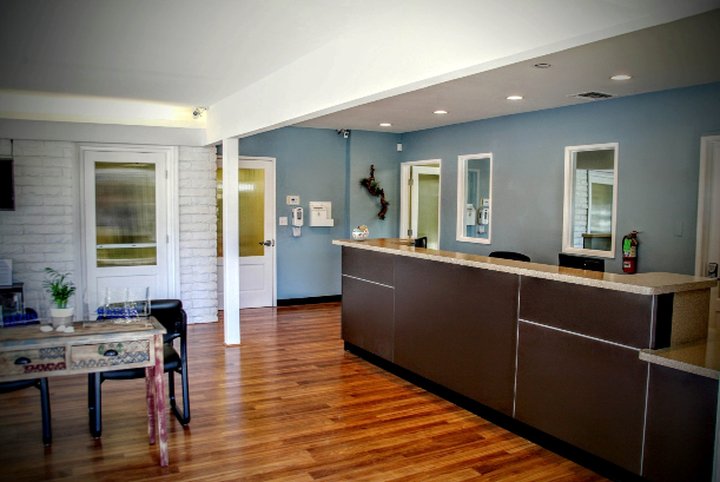
Inside an Aegis clinic. Photo: Aegis Treatment Centers
Aegis Treatment Center’s clinic will increase the availability of Medication Assisted Treatment to help fight Humboldt’s opioid epidemic
The recent Town Hall meeting gave the community another chance to learn from elected officials and assembled panelists what is happening on the opioid epidemic front. Treating a problem as deep seated and as complex as the opioid epidemic requires a comprehensive, complicated solution. There is no easy answer.
Humboldt County and Open Door have done a great job for more than 10 years in bringing MAT (“Medication Assisted Treatment”) to the community. Treating opioid addiction is like treating any other chronic relapsing disease, and, as Dr Julie Ohenmus said at the Town Hall, she would not take away the opioid addicted patient’s suboxone, methadone or vivitrol, just as she would not take away a diabetic’s insulin, or the medication for someone being treated for high blood pressure or high cholesterol.
The biggest single problem we all face is the stigma associated with the subject — stigma associated with drug addiction in the first place. It takes a very brave person to stand up and say “My daughter has a heroin problem,” just like Lisa Dugan did at the first Town Hall last year. Stigma associated with treating drug addiction. Stigma associated with the medications used (yes, that includes methadone as well as Suboxone and Vivitrol, and Naloxone to reverse overdoses) and the historic way some clinics were operated. Stigma with where treatment is located. If we don’t each do our part in breaking down the stigma, we will lose the battle against the opioid epidemic.
Lisa’s bravery in talking from the heart at the first Town Hall is the unfortunate proof that the face of addiction has changed. The show of hands in November when Sen. Mike McGuire asked the question “who here has a family member, a friend or a work colleague who has died of an opioid overdose?” was staggering. The people who suffer from this problem are members of our families and our communities. They go to the same schools and colleges as we do, they shop at the same places we do, and they live in the same ZIP codes as we do. Just ask the chief of police or the sheriff or your doctor, or your friends and family.
MAT (“Medication Assisted Treatment”) has been the medical gold standard of care for treating opioid addiction for 50 years, and has saved hundreds of thousands of lives in America and all over the world. Whilst opioid addiction has terrible consequences for the brain, the brain is an incredible part of our body. Given the chance, the addicted brain can often heal and its owner can learn how to lead a drug-free life. That is where the “T” in “MAT” — treatment — comes in. Individual and group counseling gives a person in recovery the skills and confidence to lead a drug-free life. The counseling component of MAT is the foundation for sustained and long-term recovery. The medication takes away cravings for opioids and eliminates withdrawal symptoms, allows the counseling to be effective, and allows the brain to heal itself.
In the words of an experienced addiction doctor who has treated thousands of patients in California; “medication is good, counseling is good. The best is when you put the two together.”
MAT is not the only treatment modality that can work, even though it has the advantage of evidence-based strong outcomes. Some people may be better off in an abstinence program, or residential treatment or a faith-based program. “Whatever works for the patient” is our approach. Whatever program they are in, they will for sure benefit from a strong supportive network of professionals, friends and a strong community.
Research consistently shows that only 1 in 10 people with opioid use disorder are actually in treatment. There are plenty of people out there who need our collective help.
Treatment is legal, affordable and safe. People who suffer from opioid addiction and enter treatment are making the decision to try their best to get their lives back on track — for every person who enters a treatment program, that is one less practising addict, resulting in less needle litter, less crime, less family trauma and less of all the other negative effects associated with opioid addiction.
Modern opioid treatment centers are an integral and permanent part of our society and our healthcare system, and the subject of much investment at a federal, state and county level across our nation.
A program that is run professionally, responsibly, and with accountability to the authorities that regulate it and the community in which it operates, is part of the solution, not part of the problem.
###
Alex Dodd is CEO of Aegis Treatment Centers. Yesterday, the Times-Standard reported that Aegis has abandoned plans to locate one of its treatment centers at the former offices of Eureka Pediatrics in response to community concerns. The company will now start searching for alternative locations in either Eureka or Arcata, Dodd told the T-S.
CLICK TO MANAGE